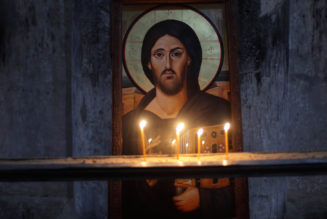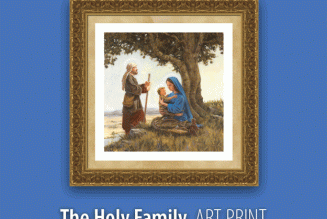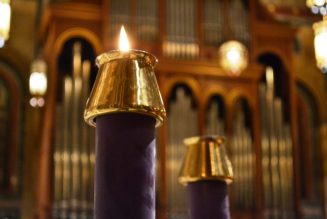, February 6, 2020
 “You are accountable not only for your own life but also for that of the entire world.”
“You are accountable not only for your own life but also for that of the entire world.”
That is how St. John Christendom sums up what Jesus says in the Gospel for the Fifth Week of Ordinary Time, Year A.
Jesus calls Christians “the salt of the earth,” and “the light of the world” — showing what he respects and what he expects.
Take salt, first. Food feels tasteless without it, but eating salt alone is unpleasant. Thus, as St. John Chrysostom puts it, “It is not for [a Christian] then to flatter and deal smoothly with men, but, on the contrary, to be rough and biting as salt is.”
That’s why, “If salt loses its taste,” says Jesus, “it is no longer good for anything but to be thrown out and trampled underfoot.”
And in fact we see this all around us. If ever there was a time for Christians to be a sign of contradiction it was during the past 50 years as the sexual revolution swept America. The clergy abuse scandals are only a small part of Catholics’ capitulation to the sexual excess of our time: Catholics rejected the Church’s teaching on contraception, then Catholic educated lawmakers wrote laws and regulations that liberalized abortion, and then Catholics voters supported those laws with their votes.
As for pornography, “What does it mean to speak of child protection when pornography and violence can be viewed in so many homes through media widely available today?” Pope Benedict XVI asked when he visited America in 2008.
We saw Christians lose their salt, and we saw exactly what Christ predicted would happen to a tasteless Christianity: The faith is increasingly rejected as useless and worth only scorn.
Light is an even more urgent metaphor for Christians in the world.
If all the light went out, the world would be dark and people would stumble around trying to feel their way. More often than not, they would run roughshod over the weak and collide with each other.
This is how people too often live today. They either lack the light of Christ to discern right from wrong, or they have only bits and pieces of the truth. They may have “welcome the stranger” morality down, but lack “the right to life” morality, or vice versa. When Christian morality is warped into one ideology or another, it becomes a spotlight that sees certain wrongs with great clarity but leaves everything else in darkness.
By comparing Christian morality to a lamp or to a city, Jesus makes one thing clear: Christianity doesn’t exist to make Christians better than others; it exists to make everyone better. To deny our light — to put it under a bushel basket — is false charity. The light may hurt the eyes of those accustomed to the darkness, but it will be better for them in the end to be able to see.
That said, the Church is certainly not a spent, darkened shell of its former glory. Not by a long shot.
When Christians are the salt of the earth, they preach the hard truths; nothing “except Jesus Christ, and him crucified,” as Paul says in the first reading.
That’s what the Church did when it came to civil rights: The Church was the first to preach integration as southern bishops desegregated schools and excommunicated pro-segregation officials.
Catholic social teaching was the salt necessary to create the 1948 Universal Declaration of Human Rights, the Nuremburg Standards and the Geneva Conventions, slowing the inhumanity of the 20th century. The largely Catholic decades-long pro-life movement is the single largest protest movement in history, dwarfing all others, with its rallies in January and life chains in October.
Meanwhile, three Catholic children in Fatima not only did more than any other individuals to stop the spread of communism, they reminded millions of the danger of hell and the need to repent.
Catholics are the light of the world to this day also.
“The just man is a light in darkness to the upright,” says the Psalm, and we have seen great Catholic lights in our time, especially St. John Paul II and St. Teresa of Kolkata. These are the Church’s true brand, more than politicians and Supreme Court justices, and far more than compromised bishops and priests.
“Your light shall break forth like the dawn,” says the First Reading, from Isaiah, when you “Share your bread with the hungry, shelter the oppressed and the homeless.”
Many Catholics are that kind of light.
“I have been to some truly dark places where the suffering would be hard for most Americans to imagine,” said Nikki Haley, former U.S. Ambassador to the United Nation. And who did she find there? The Catholic Church, doing “everyday miracles,” and “helping millions of desperate people.”
The world needs each of authentic Catholic witnesses now more than ever.
If we are inauthentic in our Catholic identity, our inauthenticity will haunt us forever. If we are authentic, our authenticity will be a source of profound joy, despite hardship, for our lifetime and beyond.
Salt keeps its flavor by staying harsh enough to season what is bland, and Jesus tells us exactly how to let our light shine: By not hiding it under a bushel basket, which was an implement of work, a way to measure grain.
In other words, our Christianity needs to have enough bite to stand out from the world, and we can’t let our worldly cares smother the light of Christ in us.
“Your light must shine before others, that they may see your good deeds and glorify your heavenly Father.”
Image: The Sacred Heart statue in Raven Memorial Park at Benedictine College in Atchison, Kansas.
Tags: Fifth Sunday in Ordinary Time Year A, prayer, Sunday Gospel, Sunday Readings
Never miss a post! Subscribe below to our weekly newsletter.








